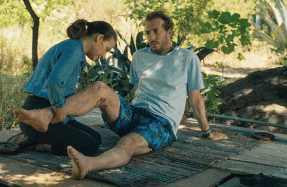
The Kingdom: Exodus (2022), the long-delayed third and final installment of Lars von Trier and Morten Arnfred’s supernatural television series, is kind of stupid. This doesn’t mean that Exodus isn’t enjoyable (it very much is), or that it lacks merit (it does not). But seen for itself, and in relation to its two earlier installments (1994/1996), the new series mostly seems like an extended jape, characterized by von Trier’s knowing mockery of both himself and the very idea of “peak TV.” Granted, The Kingdom was always little more than a portentous gag, using campfire ghost-story hokum to introduce various ideas (body horror, institutional indifference, the arrogance of medical science) in order to treat them, if not trivially, then with a somewhat limited sense of purpose.
Von Trier developed The Kingdom for Danish TV network DR after completing his first three features, and considered in that context, one can certainly perceive a learning curve. In making the first two seasons of The Kingdom, von Trier explores what would become his primary artistic preoccupation: the coexistence of good and evil. But he did so in the broadest, most declarative manner possible, creating a tale of suppressed demons bubbling up to the surface while spiking the punch with some well-honed embarrassment comedy. (Ernst-Hugo Järegård’s performance as the arrogant, beleaguered Dr. Helmer, railing against “Danish scum,” lingers in the mind long after the crying ghosts in the elevator have evaporated from memory.)
The first series of was quite a bit more invested in its haunted-hospital conceit, suggesting that King too saw it as a major thematic moment. It echoes quite directly with the opening sequence used for all three series, which explains that the hospital stands on the former site of “the bleaching ponds” where poor Danes would stand in giant chemical pools toiling away for the textile industry. Harking back to Gothic literature, used the ghost story as a way to consider history as a vertical time structure, a way to literalize the hold of the past on the present.




